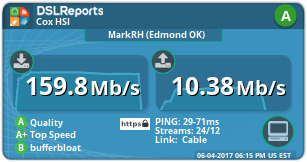RussellInCincinnati
Senior Member
...with a bit of maximum download speed lost.
An installation where internet service provider max speed clocked at 100 megabits per second max download, 12 Mbps upload. With a standard setup, my http://www.dslreports.com/speedtest grades for "bufferbloat" (i.e. periodic pauses in data flow) were terrible, "D" or "F" on a scale where A is great, then B,C,D,E,F is terrible. There were several pauses in the data flow for more than one second.
So went to the Merlin version 380.65_4 screen, clicked on "Adaptive QoS" on the left, clicked on the "QoS" tab, set "Enable QoS" to ON, set QoS Type to "Adaptive QoS", set Bandwidth Setting to "Manual", and entered in the number "11" for an 11 megabits per second Upload Bandwidth and "95" for the Download Bandwidth. Then clicked on the big circle for select priority mode, below all this, thus highlighting the circle/priority option labeled "Web Surfing". Then clicked the "Apply" button at the very bottom of the configuration screen.
Result is now a DSL Reports "A" rating for all aspects of connection quality, including bufferbloat. No pauses now in data flow, but a modest lost in peak download speeds. Up until now my impression has been that setting Adaptive QoS was not a good idea. On a simplistic level what the bufferbloat rating means is that during the speed test, there was never a pause in the flow of data for more than about one-twelfth of a second (81 milliseconds).
In exchange for the now completely reliable speed of data flow, the max download speed appears to have dropped somewhat, from 90-95 megabits per second to around 82 megabits per second. Max upload speed is 11 megabits per second, just as set in the Adaptive QoS configuration screen.
An installation where internet service provider max speed clocked at 100 megabits per second max download, 12 Mbps upload. With a standard setup, my http://www.dslreports.com/speedtest grades for "bufferbloat" (i.e. periodic pauses in data flow) were terrible, "D" or "F" on a scale where A is great, then B,C,D,E,F is terrible. There were several pauses in the data flow for more than one second.
So went to the Merlin version 380.65_4 screen, clicked on "Adaptive QoS" on the left, clicked on the "QoS" tab, set "Enable QoS" to ON, set QoS Type to "Adaptive QoS", set Bandwidth Setting to "Manual", and entered in the number "11" for an 11 megabits per second Upload Bandwidth and "95" for the Download Bandwidth. Then clicked on the big circle for select priority mode, below all this, thus highlighting the circle/priority option labeled "Web Surfing". Then clicked the "Apply" button at the very bottom of the configuration screen.
Result is now a DSL Reports "A" rating for all aspects of connection quality, including bufferbloat. No pauses now in data flow, but a modest lost in peak download speeds. Up until now my impression has been that setting Adaptive QoS was not a good idea. On a simplistic level what the bufferbloat rating means is that during the speed test, there was never a pause in the flow of data for more than about one-twelfth of a second (81 milliseconds).
In exchange for the now completely reliable speed of data flow, the max download speed appears to have dropped somewhat, from 90-95 megabits per second to around 82 megabits per second. Max upload speed is 11 megabits per second, just as set in the Adaptive QoS configuration screen.
Last edited:




